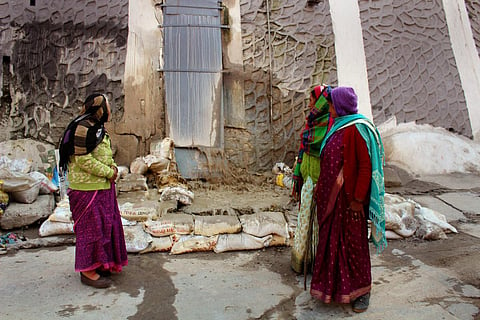

NEW DELHI/DEHRADUN: With the multiple government agencies working on to unravel the causes of the sinking of Joshimath in Uttarakhand, experts say that incessant tunnelling and poor drainage system coupled with willful disregard of sane suggestions by the authorities had caused subsidence in the town known for its spiritual connect. They suggested a scientific assessment of projects being planned in the region to prevent such devastation in the mountain region.
Anjal Prakash, Research Director at Bharti Institute of Public Policy, Indian School of Business (ISB), Hyderabad said that damage in Joshimath had taken place as the authorities failed in noting down ‘different’ voices warning against ‘development’ in the densely populated area having a very fragile ecosystem.
“Himalayan mountains are the most thickly populated mountain regions in the world; youngest in terms of formation of mountains. Inhabitants need infra; projects for health and education. But do they need hydro power plants? This is the question because most of the problem had occurred due to the tunneling process. It is a major cause of town sinking. How do these projects get sanctioned despite all the objections,” said Prakash, who earlier worked with TERI- School of Advanced Studies as an Associate Professor in the Department of Regional Water Studies.
He had also led research on glaciered rivers in Hindu-Kush Himalayan region.
Prakash further suggested scientific appraisal of projects or policies directing development in Himalayas.
“We need to stop all hydropower projects and reevaluate them. We also need to check environmental feasibility and get them examined by independent agencies. Let scientific assessment happen. Science must guide and oversee the policies; what happens in the Himalayas,” he said.
Rajendra Dobhal, Director General, Council for Science and Technology (CST), Uttarakhand also said that obviously unmindful construction in the region is to be blamed for the catastrophe.
“System is such that there is no due diligence or technical analysis for construction of houses or hotels in hills. The reports, in the past, only said that the region is fragile but never made recommendations to prevent this. Heedless constructions have put pressure on the land beyond its carrying capacity,” he said.
Tunneling for a hydropower project in the area is also being seen as one of the major reasons for the sinking phenomenon in Joshimath. The Jal Shakti ministry on Friday set up a six-member committee to study Joshimath subsidence and suggest measures for the protection of the human settlements, highways, and riverine system. The panel was given a three-day deadline to submit its report. Meanwhile, the state government has started evacuating residents as several houses, roads, and other properties have developed cracks.
Anil Jaggi, consultant working in the fields of disaster management and sustainable development, said that the situation in the hill state is a disaster waiting to happen as ‘commercialised development’ in the ‘fragile’ mountains over the years had made the region vulnerable.
“Following a landslide, debris concentrated in Joshimath, which gradually hardened. People raised construction on the accumulation. The Mishra Commission report in 1976 had warned against the risk. Because of construction underground water sources are closed however water keeps flowing randomly and bounces back. Then poor drainage systems lead to Joshimath-like incidents,” Jaggi explained.
Declare Joshimath a national calamity: Congress
Describing the land subsidence situation in Joshimath as a man-made disaster, the Congress on Monday demanded that it should be declared a national calamity and affected residents should be provided compensation should be from the Prime Minister Care fund. The party also demanded that all developmental projects in the area should be stopped until a report by experts and environmentalists is submitted on the issue.